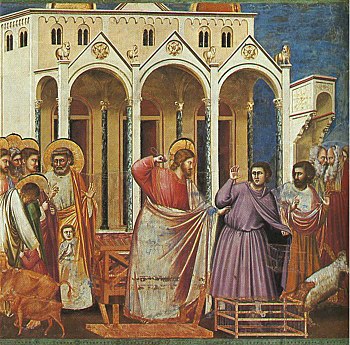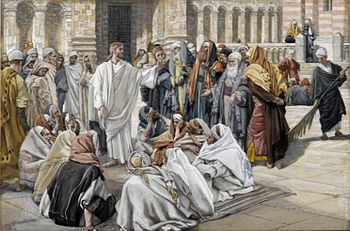Jesus’ ministry during the final week of his life was directed at one group of people in particular.
during the final week of his life was directed at one group of people in particular.
Can you think which group it was?
Here’s a hint: He didn’t come to condemn them, He came to save the world. (John 3:17)
Jesus’ ministry to those who hated him.
A close examination of that final week in Jesus’ ministry shows a particular interest in reaching the Sadducees and the Pharisees.
But he came to save the lost?
Who was more lost than those who studied scripture their wholes lives yet missed the Messiah?
Oh, sure, Jesus spoke to other Jews and Gentiles–anyone within hearing distance– but he paid close attention to the learned.
They were blind–deliberately in many cases–but Jesus wanted them in heaven.
Jesus did not ignore those who persecuted Him. He engaged them. Here’s a breakdown:
Palm Sunday
Jesus rode into Jerusalem on Palm Sunday and the crowd went wild, laying clothes and palm branches before his donkey.
“And some of the Pharisees called to Him from the crowd, “Teacher, rebuke Your disciples.”
” But He answered and said to them, “I tell you that if these should keep silent, the stones would immediately cry out.”” (Luke 19:39-40 NKJV)
Why did the Pharisees want the disciples rebuked?
They didn’t like how Jesus–who had raised Lazarus from the dead not a few days before–looked like a conquering king coming to lay claim to their power, particularly at the Temple.
The high priest had declared Jesus should die for the good of the Jews (or at least those in power).

Entry of the Christ in Jerusalem by Jean-Léon Gérôme (Wikimedia Commons)
The Pharisees wanted to squash any enthusiasm for Jesus’ ministry.
Monday
Upon Jesus’ return Monday morning, he went straight to the Temple. It was Passover week, visitors jammed the city.
Once there,
“The blind and the lame came to Him in the temple, and He healed them. But when the chief priests and scribes saw the wonderful things that He did, and the children crying out in the temple and saying, “Hosanna to the Son of David!” they were indignant and said to Him, “Do You hear what these are saying?”
“And Jesus said to them, “Yes. Have you never read, ‘Out of the mouth of babes and nursing infants/ You have perfected praise’?”(Matthew 21:14-17)
Displaying his healing powers on Temple grounds pointed to the inability of the high priest and his associates to do the same.
They didn’t like being shown up, much less, hearing shouts of praise. (Think of King Saul watching David enter Jerusalem to shouts of praise),
Outraged by the money changers with Temple walls, Jesus’ ministry also involved clearing them out and not allowing anyone to bring back saleable items.
He’d done it before, but this time, indignation ruled the Temple authorities.
Jesus’ ministry went right to the point, their disdain for God’s house.
Jesus called them on their poor spiritual leadership (which was always His complaint against them):
“Is it not written, ‘My house shall be called a house of prayer for all nations’? But you have made it a ‘den of thieves.’
“And the scribes and chief priests heard it and sought how they might destroy Him; for they feared Him, because all the people were astonished at His teaching.” (Mark 11:16-18)
It may seem harsh, but how else could Jesus provoke their attention?
Until the Temple authorities were willing to acknowledge responsibility for not honoring God, how could they change?
Remember, they were planning to kill Jesus.
But he kept coming back to confront them with the truth about their hearts.
Tuesday
Authorities awaited Jesus at the Temple.
They demand to know by whose authority Jesus cleared the Temple.
“If you tell Me, I likewise will tell you by what authority I do these things: The baptism of John—where was it from? From heaven or from men?”
“And they reasoned among themselves, saying, “If we say, ‘From heaven,’ He will say to us, ‘Why then did you not believe him?’ But if we say, ‘From men,’ we fear the multitude, for all count John as a prophet.”
So, they answered Jesus and said, “We do not know.”
“And He said to them, “Neither will I tell you by what authority I do these things.” (Matthew 21: 24-27)
Jesus spent considerable time afterward telling parables. He wanted those with eyes to see the truth and yearned to give one more chance to those determined to be blind.
His parables were pointed: the two sons, the vinedressers in the vineyard, the parable of the wedding feast. He also answered questions the leaders designed to trip him.
Jesus’ answers enraged them.
Jesus then turned the tables and spoke from his heart, in Matthew 23:37-39:
“O Jerusalem, Jerusalem, the one who kills the prophets and stones those who are sent to her!
How often I wanted to gather your children together, as a hen gathers her chicks under her wings, but you were not willing!
See! Your house is left to you desolate; for I say to you, you shall see Me no more till you say, ‘Blessed is He who comes in the name of the Lord!’”
He longed to gather them into the Kingdom of God, but they rejected him.
They had hardened their hearts and Jesus’ ministry to them–his attempt to draw them to the authentic Messiah standing before them–had failed with some, but not with all.
Wednesday
On Wednesday, Jesus remained with his disciples in nearby Bethany.
The Temple authorities sought out Judas and made arrangements to kill Jesus.
Jesus knew but did nothing to stop their actions.
Thursday
The Last Supper occurred on this day.
When Judas left to help the Temple authorities in their plot against him, Jesus let the man go.
Later that night in the Garden of Gethsemane, when Peter cut off the ear of the High Priest’s servant, Jesus healed it.
There in the Garden, Jesus’ reached out again:
“But Jesus said to him, “Put your sword in its place, for all who take the sword will perish by the sword.
Or do you think that I cannot now pray to My Father, and He will provide Me with more than twelve legions of angels? How then could the Scriptures be fulfilled, that it must happen thus?”
” In that hour Jesus said to the multitudes, “Have you come out, as against a robber, with swords and clubs to take Me? I sat daily with you, teaching in the temple, and you did not seize Me. But all this was done that the Scriptures of the prophets might be fulfilled.” (Matthew 26: 52-56)
Any Pharisee or Sadducee willing to hear what Jesus said, had another opportunity to change.
They had to be willing to look at the scriptures from a different point of view, and then all of Jesus’ ministry would become clear.
But they chose not to.
Good Friday
Events of Good Friday are well-known. Notice that when Jesus appeared before the Sanhedrin, he used a term underscoring who he was:
“Again the high priest asked Him, saying to Him, “Are You the Christ, the Son of the Blessed?”
“Jesus said, “I am. And you will see the Son of Man sitting at the right hand of the Power and coming with the clouds of heaven.” (Mark 14: 61-62)
He engaged them once more, but they refused to consider Jesus as the Messiah.
The Jewish authorities turned Jesus over to the Romans, who crucified him.
But even on the cross as the soldiers gambled for his clothes, Jesus appealed to God: “Father, forgive them, for they do not know what they do.”
He forgave the thief on the cross who recognized Jesus as the Messiah.
Who knew what other witnesses thought?
After the Resurrection
Many people became believers at Pentecost and afterward–thousands, and among them were many Pharisees, according to notes in my Lutheran Study Bible.
Acts 6:7 notes many priests ultimately recognized the man they persecuted really was the Messiah.
“Then the word of God spread, and the number of the disciples multiplied greatly in Jerusalem, and a great many of the priests were obedient to the faith.”
That last week of reaching out to Pharisees and Sadducees, eventually bore fruit.
Jesus’ ministry to even those who hate him continues to this day.
Some need to recognize the resurrection of the Messiah as truth before they can bow their knees.
All come to God in their own time and way–but even as Jesus demonstrated during his last week on earth–he desires all to be saved.
Easter demonstrates God’s love and is the reason for Jesus’ ministry.
Tweetables
Dealing with Jesus’ enemies in his final week. Click to Tweet
What did Jesus think of the Pharisees and Sadducees? Click to Tweet
Jesus: reaching with love to those who hate during Holy Week. Click to Tweet







Good work . . . Thank you!